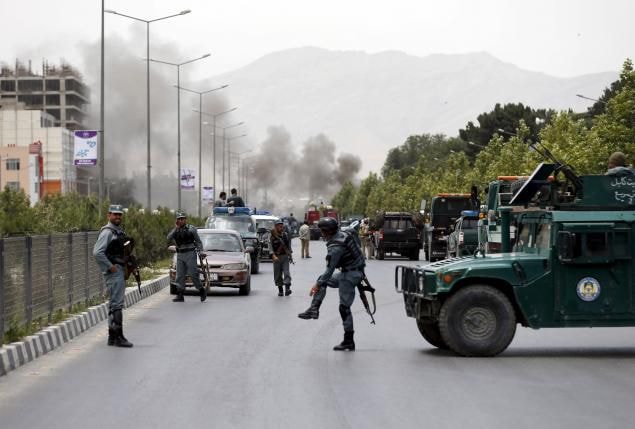The political message behind the attack on the Afghan parliament building
(Baonghean) - 2015 was a year that saw some of the Taliban’s most significant battlefield victories, and its most significant period of informal negotiations. Many still held out hope that this would be the year when formal talks between the Taliban and the government would have the best chance of moving forward after a long period of stalemate and intense fighting. But the attack earlier this week seemed to have dashed that fragile hope.
According to analysts, the daring attack on the heavily guarded Afghan Parliament on June 22 shows that the Taliban continues to demonstrate its ability to wreak death in the heart of the Islamic nation’s capital, Kabul. But more importantly, the incident also shows that the war in Afghanistan involves not only military forces but also political activities.
 |
| Smoke rises from the scene of the attack on the Afghan Parliament Building on June 22. Photo: Reuters |
While the toll from the attack was not as high as other high-profile attacks in Kabul, the widely broadcast images of the heavily attended session of parliament abruptly interrupted by the initial explosion, coupled with the highly symbolic nature of the target (i.e. the building), were seen as sending a clear political message.
First of all, it must be admitted that the attack was very carefully timed - right during the fasting month of Ramadan, just as MPs gathered in Parliament House to confirm the appointment of a new Defense Minister, the building was shaken by explosions.
The Taliban have recently seized significant territory in both the north and south of the country. Despite recent informal peace talks in Qatar and Norway, progress has been limited. Some say this is partly due to the Taliban’s perception that the central government is weak.
Another aspect that may explain the Taliban’s recent political and military activism is the bloody attacks carried out by the self-proclaimed Islamic State (IS) over the past year. With several key Taliban leaders defecting to IS, there are concerns that IS represents a new source of funding and political legitimacy that the Taliban has lost through years of protracted fighting and civilian casualties.
While it must be admitted that the increase in the number of attacks is alarming in Afghanistan, this is still considered a pivotal moment to push for a political solution to a conflict that seems increasingly difficult, if not impossible, to conclude a military solution.
But the attack on the parliament building underscored the political sensitivity of the situation and the need for political support from the international community. Many Afghans say a key factor in the attack was the day lawmakers were set to vote on President Ashraf Ghani’s nominee for defense minister, Masoom Stanekzai. Stanekzai, widely respected by many factions of Kabul’s elite, was seen by many as the candidate who could combine military and political efforts to stabilize the country.
The defense minister’s post has been vacant for months, since Ghani took office in September 2014, and the vacancy has become a point of contention among Kabul’s political elite. Ghani’s inability to appoint a successor has been seen as emblematic of his difficulties in creating a government that can counter the Taliban. In simple terms, the attack only delayed the vote, but for many Afghans frustrated by the slow pace of reform and the country’s stagnant economy, it showed how shaky their rule has become.
The date of the attack is also notable because it was supposed to be the end of the parliament’s legal term. However, with this year’s parliamentary elections postponed, Ghani has said that they will remain in office until new elections are scheduled. The attack highlights the uncertain legal status of the current parliament and Ghani’s struggle to co-opt the country’s various political parties into his coalition government.
With the US military still present in the country and a strong popular desire to end the war, there is still a real chance of progress on a peace deal, which could allow the US to withdraw some troops and provide more practical support for Ghani’s political and economic reforms.
But such a deal would be more political than military. To take advantage of this moment, when the Taliban’s willingness to negotiate may be growing, the Afghan government needs to push through reforms that would make it more unified and more legitimate. This includes electoral reforms after last year’s deeply flawed presidential election and a constitutional agreement that would clarify the legal status of the current coalition government. While most of these issues are the responsibility of Afghan politicians, international pressure on Ghani to continue his political reform agenda, and support for him in dealing with some of his commander-in-chief allies who oppose such changes, would help.
In short, the attack on the Afghan parliament not only shows that the Taliban’s military threat is still ongoing, but also makes it clear that the response of the Afghan government and the international community that supports it must be a clear agenda for political reform. Without that, as the BBC has noted, no one can be sure that the “battle for peace” in the country will be won.
Thu Giang






